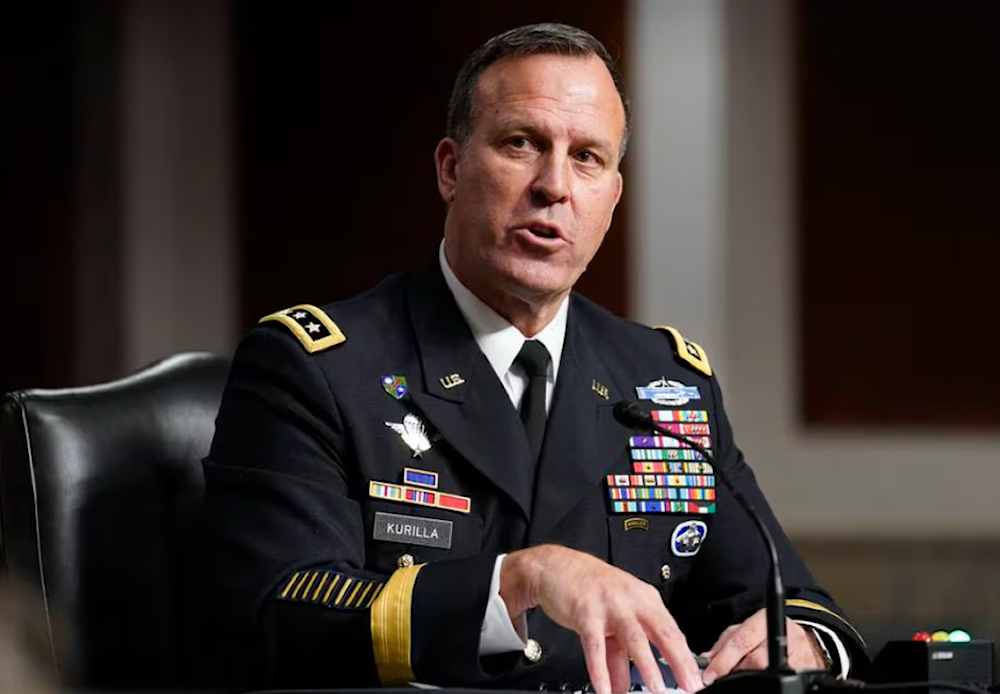CENTCOM commander does not recommend US withdrawal from Iraq
Michael Kurilla said he would not recommend the withdrawal of US troops from Iraq until the country could handle "regional threats" on its own.
-

Lt. Gen. Michael Kurilla testifies before the Senate Armed Services Committee during his confirmation hearing on February 8, 2022. (AP)
Gen. Michael Kurilla, commander of US Central Command, said in a congressional hearing on Thursday that he would not advise US President Joe Biden to remove American troops from Iraq until the country can manage the prevailing "regional threats" on its own.
Kurilla expressed during a House Armed Services Committee meeting that Iraq would need to handle "that fight by themselves."
Celeste Wallander, US Assistant Secretary of Defense for International Security Affairs, concurred with Kurilla's testimony about the matter throughout the hearing.
Last month, the Iraqi Prime Minister, Mohammed Shia al-Sudani, announced that his country had requested the US-led international coalition to end its 10-year-long mission in Iraq, emphasizing the effectiveness and capabilities of the Iraqi security services.
Al-Sudani made these remarks during a dialogue seminar, coinciding with his official visit to the Netherlands. The seminar was attended by a group of businessmen and representatives from 40 Dutch companies.
According to the PM, "The main purpose of winding down the US-led military coalition’s mission is to eliminate all possible pretexts for attacks on its advisors."
In a related context, in an interview with Reuters in January, al-Sudani called for an agreement on a specific timeframe for the withdrawal of the US-led international coalition in Iraq which "honestly" needs to be "quick".
He stressed, "Let's agree on a timeframe that is, honestly, quick, so that they don't remain long and the attacks keep happening."
Leaving Iraq may be Washington’s wisest choice: Foreign Policy
According to a report published by Foreign Policy in February, the United States carried out two rounds of airstrikes against Iraqi Resistance forces in response to the death of three US soldiers in Jordan in late January.
However, Foreign Policy suggests that these strikes may provoke significant political backlash in Baghdad, with uncertain implications for the US military presence in Iraq.
For years, the United States has wasted significant resources and personnel in Iraq. The report indicates that Baghdad may eventually determine it's time for the United States and the coalition to withdraw, allowing Iraq to independently address the ongoing threat posed by ISIS.
It suggests that twenty years after the invasion of Iraq, it is now appropriate for the Biden administration to begin considering the optimal approach for minimizing the US military presence there, adding that "while American forces in Iraqi Kurdistan act as a crucial node for logistical support for the forces in Syria, this presence may also no longer be necessary if Washington withdraws its small military contingent from Syria."
The report also says that aside from the Kurdistan contingent, the ongoing US military presence in Iraq is becoming less beneficial. It highlights the risk of damaging US credibility with a sudden withdrawal similar to the events in Afghanistan. Moreover, pulling out from Iraq could solidify the perception of a US military retreat, especially considering the strategic shift towards focusing on Asia, the report added.

 3 Min Read
3 Min Read








